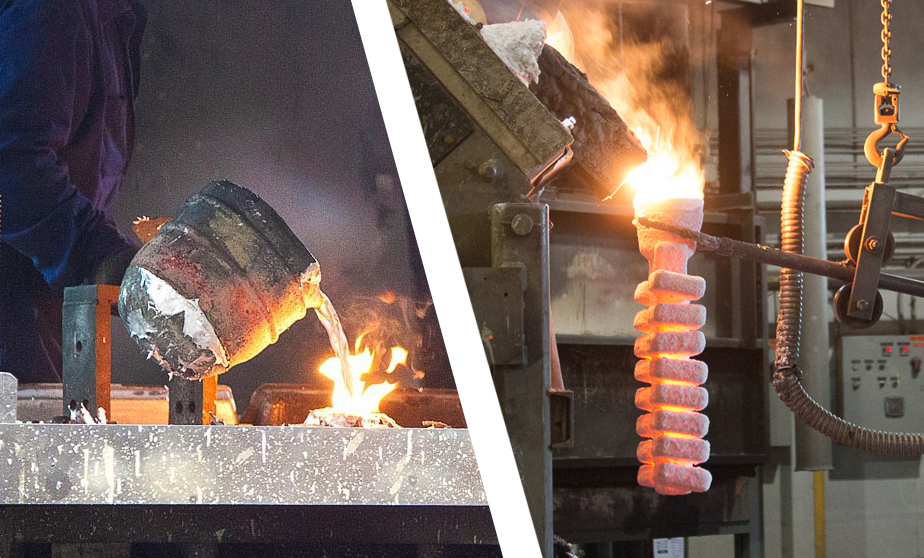The Definitive Guide for Stahl Specialty Company
The Definitive Guide for Stahl Specialty Company
Blog Article
A Biased View of Stahl Specialty Company
Table of ContentsThe smart Trick of Stahl Specialty Company That Nobody is DiscussingStahl Specialty Company - An OverviewAll about Stahl Specialty CompanyStahl Specialty Company - TruthsThe Stahl Specialty Company PDFs
The refined difference depends on the chemical content. Chemical Comparison of Cast Aluminum Alloys Silicon advertises castability by lowering the alloy's melting temperature level and enhancing fluidness throughout spreading. It plays a crucial role in allowing elaborate molds to be filled up accurately. Additionally, silicon adds to the alloy's strength and use resistance, making it beneficial in applications where longevity is crucial, such as automotive parts and engine elements.It likewise improves the machinability of the alloy, making it less complicated to refine into completed items. In this means, iron contributes to the overall workability of light weight aluminum alloys.
Manganese adds to the stamina of light weight aluminum alloys and enhances workability. It is commonly made use of in functioned aluminum items like sheets, extrusions, and profiles. The visibility of manganese aids in the alloy's formability and resistance to splitting during manufacture processes. Magnesium is a lightweight element that offers toughness and influence resistance to aluminum alloys.
It permits the manufacturing of light-weight parts with exceptional mechanical buildings. Zinc improves the castability of light weight aluminum alloys and assists control the solidification procedure throughout casting. It enhances the alloy's strength and solidity. It is typically located in applications where detailed shapes and fine information are essential, such as decorative castings and certain automotive parts.
8 Simple Techniques For Stahl Specialty Company
Because aluminum-silicon alloys have good casting buildings, high gas properties, basic procedures, and excellent corrosion resistance, aluminum-silicon alloys are most typically made use of in the die-casting industry in your home and abroad. At the exact same time, aluminum-silicon alloys are also relatively early and extensively identified alloys established and utilized in die-casting. After continuous research and renovation, a lot of the present international mainstream aluminum-silicon alloys have been completed and are nothing greater than A356, A360, A380, ADC12, B390, and A413.
The primary thermal conductivity, tensile toughness, yield stamina, and elongation vary. Amongst the above alloys, A356 has the highest thermal conductivity, and A380 and ADC12 have the most affordable.

The Of Stahl Specialty Company
In accuracy spreading, 6063 is well-suited for applications where elaborate geometries and top quality surface area finishes are vital. Instances consist of telecommunication enclosures, where the alloy's remarkable formability permits sleek and cosmetically pleasing designs while maintaining structural integrity. In the Lights Solutions market, precision-cast 6063 elements develop elegant and efficient illumination components that need elaborate shapes and good thermal performance.
(https://www.pinterest.com/pin/1108589264525265586)
The A360 displays remarkable elongation, making it optimal for complex and thin-walled components. In precision casting applications, A360 is appropriate for sectors such as Customer Electronic Devices, Telecommunication, and Power Devices.

In accuracy casting, aluminum 413 shines in the Customer Electronic Devices and Power Equipment industries. It's commonly made use of to craft complex components like smart device housings, video camera bodies, and power tool casings. Its precision is exceptional, with tight resistances as much as 0.01 mm, making certain remarkable product assembly. This alloy's remarkable deterioration resistance makes it an excellent choice for exterior applications, making certain resilient, sturdy items in the pointed out markets.
Stahl Specialty Company - An Overview
The aluminum alloy you select will substantially affect both the casting process and the buildings of the last product. Since of this, you need to make your decision thoroughly and take an enlightened strategy.
Determining the most appropriate aluminum alloy for your application will certainly indicate considering a large variety of attributes. The initial group addresses alloy attributes that influence the manufacturing process.
The alloy you choose for die spreading straight affects a number of aspects of the spreading process, like how very easy the alloy is to work with and if it is susceptible to casting defects. Warm splitting, likewise called solidification fracturing, is a common die casting defect for light weight aluminum alloys that can cause inner or surface-level splits or splits.
The 25-Second Trick For Stahl Specialty Company
Particular light weight aluminum alloys are much more susceptible to warm fracturing than others, and your option ought to consider this. Foundry near me. It can harm both the cast and the die, so you need to look for alloys with high anti-soldering homes.
Deterioration resistance, which is currently a remarkable feature of light weight aluminum, can differ substantially from alloy to alloy and is an important characteristic to consider depending on the environmental problems your product will be subjected to. Wear resistance is one more residential property frequently sought in light weight aluminum products and can separate some alloys.
Report this page